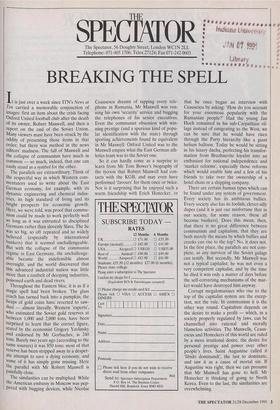• # • # • 41 • • • *
• ill • • •
• Milliate
• t7 • •
The Spectator, 56 Doughty Street, London WC1N 2LL Telephone: 071-405 1706; Telex 27124; Fax 071-242 0603
Libtaty
e•lbeera• 4100,000#••
BREAKING THE SPELL
It is just over a week since ITN's News at Ten carried a memorable conjunction of images: first an item about the crisis facing Oxford United football club after the death of its owner, Robert Maxwell, and then a report on the end of the Soviet Union. Many viewers must have been struck by the oddity of presenting those items in that order; but there was method in the news editors' madness. The fall of Maxwell and the collapse of communism have much in Common — so much, indeed, that one can easily stand as a symbol for the other.
The parallels are extraordinary. Think of the respectful way in which Western com- mentators used to write about the East German economy, for example, with its dynamic engineering and chemical indus- tries, its high standard of living and its bright prospects for economic growth. Here, we were told, was proof that commu- nism could be made to work perfectly well so long as it was entrusted to disciplined Germans rather than slovenly Slays. The lie was so big, so oft repeated and so widely believed (especially by international bankers) that it seemed unchallengeable. But with the collapse of the communist regime in East Germany, the unchallenge- able became the indefensible almost overnight, and the world discovered that this advanced industrial nation was little more than a rustbelt of decaying industries, poisoned earth and dead rivers,
Throughout the Eastern bloc, it is as if a magic spell had been broken. The glass coach has turned back into a pumpkin; the heaps of gold coins have reverted to saw- dust — almost literally. Western 'experts', who estimated the Soviet gold reserves at between 1,000 and 2,000 tons, have been surprised to learn that the correct figure, stated by the economist Grigory Yavlinsky and endorsed by Mr Gorbachev, is 240 tons. Barely two years ago (according to the same sources) it was 850 tons: most of that reserve has been stripped away in a desper- ate attempt to save a dying economy, and some of it has simply gone missing. Here the parallel with Mr Robert Maxwell is Painfully close.
The similarities can be multiplied. While the American embassy in Moscow was pep- pered with bugging devices, while Nicolae Ceausescu dreamt of tapping every tele- phone in Rumania, Mr Maxwell was run- ning his own 'security' service and bugging the telephones of his senior executives. Even the communist obsession with win- ning prestige (and a spurious kind of popu- lar identification with the state) through sporting achievements found its equivalent in Mr Maxwell: Oxford United was to the Maxwell empire what the East German ath- letics team was to the Soviet one.
So it can hardly come as a surprise to learn from Mr Tom Bower's biography of the tycoon that Robert Maxwell had con- tacts with the KGB, and may even have performed 'favours' for them once or twice. Nor is it surprising that he enjoyed such a warm friendship with Erich Honecker, or
that he once began an interview with Ceausescu by asking: 'How do you account for your enormous popularity with the Rumanian people?' 1-lad the young Jan Hoch remained in his sub-Carpathian vil- lage instead of emigrating to the West, we can be sure that he would have risen through the Party hierarchy like a giant helium balloon. Today he would be sitting in his luxury dacha, perfecting his transfor- mation from Brezhnevite loyalist into an enthusiast for national independence and `market reforms', especially those reforms which would enable him and a few of his friends to take over the ownership of a hotel chain or a shipping company.
There are certain human types which can be found under any system of government. Every society has its ambitious bullies. Every society also has its foolish, clever-silly dupes (and it is just our misfortune that in our society, for some reason, these all become bankers). Does this mean, then, that there is no great difference between communism and capitalism, that they are both merely the means by which bullies and crooks can rise to the top? No, it does not. In the first place, the parallels are not com- plete, as any survivor of the Soviet gulags can testify. But secondly, Mr Maxwell was not a typical capitalist; he was not even a very competent capitalist, and by the time he died it was only a matter of days before the self-correcting mechanisms of the mar- ket would have destroyed him anyway.
Corrupt megalomaniacs who rise to the top of the capitalist system are the excep- tion, not the rule. In communism it is the other way round. Capitalism depends on the desire to make a profit — which, in a society properly regulated by laws, can be channelled into rational and morally blameless activities. The Maxwells, Ceaus- escus and Honeckers of this world are ruled by a more irrational desire, the desire for personal prestige and power over other people's lives. Saint Augustine called it `libido dominandi', the lust to dominate, and saw it as a cause of mortal sin. If Augustine was right, then we can presume that Mr Maxwell has gone to hell. Mr Honecker is thinking of going to North Korea. Even to the last, the similarities are overwhelming.










































































































 Previous page
Previous page